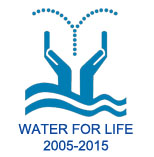10 June 2010: Organized by the Government of the Republic of Tajikistan and the UN, the High Level International Conference on the Midterm Comprehensive Review of the Implementation of the International Decade for Action “Water for Life” 2005-2015, took place from 8-10 June 2010, in Dushanbe, Tajikistan.
Participants focused on six themes: accelerating progress towards […]
 10 June 2010: Organized by the Government of the Republic of Tajikistan and the UN, the High Level International Conference on the Midterm Comprehensive Review of the Implementation of the International Decade for Action “Water for Life” 2005-2015, took place from 8-10 June 2010, in Dushanbe, Tajikistan.
10 June 2010: Organized by the Government of the Republic of Tajikistan and the UN, the High Level International Conference on the Midterm Comprehensive Review of the Implementation of the International Decade for Action “Water for Life” 2005-2015, took place from 8-10 June 2010, in Dushanbe, Tajikistan.
Participants focused on six themes: accelerating progress towards water-related internationally-agreed development goals, including the Millennium Development Goals (MDGs), and ensuring involvement of women; transboundary water cooperation; water quality; water resources and adaptation to climate change, disaster risks reduction; sustainable financing; and Integrated Water Resource Management, energy, agriculture and food security. The outcome of the High Level Conference consists of a number of conclusions and recommendations contained in the Dushanbe Declaration on Water, which will be submitted to the UN General Assembly at its 65th session by the Government of Tajikistan.
In the Declaration, participants note the achievements during the first five years of the International Decade for Action “Water for Life” 2005-2015 on the implementation of water-related programmes and projects, but that many major obstacles resulted from the persisting challenges and newly emerging issues resulting from the recent global crises, including the energy, food and financial crises coupled with the increasing impacts of climate change. In this context, they highlight that, inter alia: climate change affects people’s livelihoods and well-being mainly through adverse impacts on the hydrological cycle; it is vital to build resilience and reduce vulnerabilities to extreme events, namely floods, droughts and other hydro-climatic hazards; it is crucial to enhance and strengthen hydrologic, hydrogeologic and meteorological data collection, assessment and dissemination capabilities, including as part of the implementation of the Global Framework for Climate Services; sustainable hydro-energy generation may contribute to important progress in poverty reduction, mitigating climate change, and achieving sustainable development, particularly in developing countries; developing countries should be provided with sustained and predictable financial assistance and technology transfer, on fair and equitable terms, according to the principle of common but differentiated responsibilities, in order to successfully address the challenges related to drinking water, environmental sanitation and the implementation of adaptation measures to climate change at the national level.
The Declaration concludes by underlining that, sincewater is a cross-cutting issue, the messages contained in the Declaration also should be communicated to the decision makers and stakeholders outside the water domain, and decisions in other sectors, including responses to climate change, need to incorporate water as an integral component. [Meeting Website] [The Declaration]